外研版必修一英语:Module3 My First Ride on a Train. 教案6
外研版高中英语必修一Module3 My First Ride on a Train知识点精讲及练习(含答案)

外研版高中英语必修一Module3 My First Ride on a Train知识点精讲及练习【重点单词短语】match + A + to/with + B 把…和…搭配起来/调和起来e.g. match practice to theory 理论与实践相结合match one’s actions to one’s words【归纳拓展】match+ n. + in/ for + n. 在…与…匹敌,成为…的对手e.g. No one can match her in knowledge of classical music.match+ n. + against/ with+ n. 使…(和…)交手/比赛e.g. He matched his shooting skill against the expert’s.match+ n. 或 match + adv. (和…)调和、适合、与…相配e.g. Her clothes don’t match her age.Her fingerprints ________ (match) those _________ (find) at the scene of the crime.As a couple they are not very well _________ (match).辨析 match / suit/ fitMatch多指大小、色调、形状、性质等方面的搭配;suit多指合乎需要、口味、性格、条件、地位等;fit 多指尺寸、形状合适,引申为“吻合”“协调”。
That doesn’t match your temperament.No dish suits all tastes.My new evening dress fits me quite well.2. distance n.距离,远方,远处The faces of four famous American presidents on Mount Rushmore(拉什莫尔山)can be seen from a ____ of 60 miles.A. lengthB. distanceC. wayD. space【归纳拓展】in the distance 在远处;在远方at a distance 在稍远处keep one’s distance from 与…保持一定距离keep sb. at a distance 与…保持距离;不予某人接近distant adj. 远的;疏远的;稀疏的;冷淡的be distant towards sb. 对...冷淡be distant from 离… 远3.means n.方式,手段(单复数同形)e.g.There is no doubt that radio and television are important means of communication.There is no means of finding out what happened.【归纳拓展】1. by means of sth. 用…的办法e.g. The government helped the victims of the earthquake by every means.He climbed up the tree by means of a ladder.2.by no means 绝不,一点也不(置于句首时须倒装)e.g.By no means is this fight the end of out friendship.【及时训练】1.Every possible means ______ been tried, and we find only ______ this means can we do it we.A. have; inB. have; byC. has; inD. has; by2.For him ______ stage is just ______ means of making a living.A. a aB. the aC. the; theD. a; the4. refer to 提到,涉及;说起;参考,查阅;指的是 (referred, referred, referring)e.g We agreed never to refer to the matter again.我们一致同意再也不提这件事。
外研版高中英语必修1《Module 3 My First Ride on a Train》课件

感想
时间
见闻
一般过去式
交通
人物 地点
I had my first visit to ...with my family when I was ...
I paid a visit to ...for the first time when I was ...with my family.
TgMaSTlahrnhhneoadeedauncGEtmndeuirtfoasleftTtnerauakgwltrisTaPWioosolrnwsfoaadivPlgemleinarnorriosciffisuiseocC.no,afhCtnntiahnechineiaenoloiafwos.ftcoohharneitlseedtdoorifinctahle
• I can remember my first visit to the zoo when I was 8 years old. I saw a lion sleeping all the time . What a lazy lion!
• I paid a visit to the zoo for the first time when I was 8 years old. I saw a lion sleeping all the time . What a lazy lion!
I can remember my first visit to ...when I was ...with my family.
It was the first time that I had paid a visit to ...with my family when I was ... 当我八岁时我和父母一起去了北京
外研版高中英语必修一Module3《MyFirstRideonaTrain》ModuleReview

【句式训练】 喝这么多酒没好处。 It’snogooddrinkingsomuch.
2.v.+-er→n. interview(v.)采访;面试→__in__te_r_v_ie_w__e(rn.)主考官;面试者 【类记】 sing(v.)唱歌→__s_in_g_e_r(n.)歌唱家 teach(v.)教;教书→___t_e_a_ch_(enr.)教师 write(v.)写→__w_r_i_t_er(n.)作家
Ⅲ.句式点拨 1.你认为他的建议怎么样?(TrueorFalse) (1)Whatdoyouthinkishissuggestionlike?() F (2)Whatdoyouthinkhissuggestionislike?() T 【思路点拨】 doyouthink是插入语,将其去掉后,剩下的句子应该是一个陈述 语序的句子。
in the distance frightened
5.去年在这个镇有超过一万只鸟被射杀。 Lastyear,__m__o_r_e_t_h_a1n0,000birdswere____inshthoitstown. 6.我第一次到海边就被那里的美景吸引了。 Iwasattractedbythebeautiful____s_c_en__er_y__t_h_e__fi_r_s_t Itwimenettothe____ __. seaside 7.长途旅行之后,我们都疲惫不堪。 Afteralong__j_o_u_r_n_e,ywewereall_____e_x_h_a_u.sted 8.我们在半夜发现了一辆被遗弃的汽车。 Wefoundan__a_b_a_n__d_o_n_ecdarat____m_i_d_n_i.ght
高中英语课件madeofcan Nhomakorabeauohanxing
外研版必修一英语:Module3 My First Ride on a Train. (Grammar) 课件
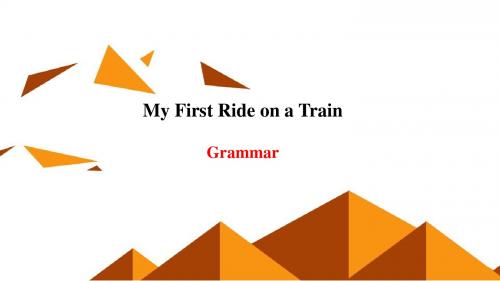
迷惑的表情
_p_u__zz_l_e_d_e_x_p_r_e_s_s_io_n_
失望的孩子们
__d_is_a_p_p_o_i_n_t_ed__c_h_i_ld_r_e_n
累了的人们
_e_x_h_a_u_s_t_e_d_p_e_o_p_l_e_
满意的表情 一本有趣的书
_s_a_t_is_f_ie_d__e_x_p_r_es_s_i_o_n _a_n__in__te_r_e_s_ti_n_g_b__o_o_k__
Use similar time expressions to complete these sentences. 1.People first started travelling by train ___in__1_9_2_5__. 2. We had a nice holiday last year. __D_u_r_i_n_g_t_h_e_d__a_y, we visited museums. _A_t__n_ig_h_t_, we went to a music club. 3.__R__e_c_en__tl_y_, I travelled by bus to meet a friend of mine who now lives in another city. 4.__A__h_u_n_d_r_e_d_a_n_d__f_if_t_y_y_e_a_r_s_a_g_o_ , there was a huge railway station in the middle of the city, but it isn’t there any longer.
及物动词的过去分词作定语只表示动作的完成,而没
有被动的意义。例如:
落叶
f_a_l_le_n__le_a_v_e_s
外研版高中英语必修1课件-Module3 My First Ride on a Train

Ghan train Ghan is short for Afghanistan.
【读而后思】 What did the writer think of her first trip on the train? She enjoyed the trip very much and thought it great.
Module 3 My First Ride on a Train Introduction & Reading and Vocabulary
Ⅰ. 速记单词 1. 音意记忆。
helicopter
tram camel cassette diamond expert
shoot soil
journey
2. 形意记忆。 (1)distance(n. )距离→_d_is_t_a_n_t(adj. )遥远的 (2)abandoned(adj. )被遗弃的→_a_b_a_n_d_o_n_(vt. )丢弃; 遗弃 (3)desert (n. )沙漠→_d_e_s_e_rt_ (vt. )遗弃, 抛弃→_d_e_s_e_rt_e_d_(adj. )被抛 弃的, 荒废的 (4)_p_r_o_d_u_c_t(n. )产品→produce(vt. )生产→_p_r_o_d_u_c_t_io_n_(n. )生产; 制作 (5)_s_c_e_n_e_r_y (n. )风景; 景色→scene (n. )场景 (6)_t_r_a_in_ (vt. )训练→training (n. )培训
【归纳拓展】 in the distance at a distance at a distance of from a distance keep one’s distance from keep sb. at a distance
高中英语外研版:必修一 module 3 my first ride on a train 含答案
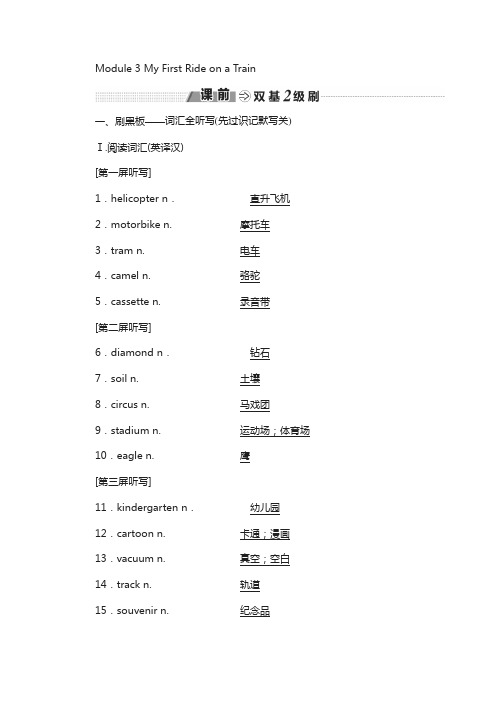
Module 3 My First Ride on a Train一、刷黑板——词汇全听写(先过识记默写关)Ⅰ.阅读词汇(英译汉)[第一屏听写]1.helicopter n.直升飞机2.motorbike n. 摩托车3.tram n. 电车4.camel n. 骆驼5.cassette n. 录音带[第二屏听写]6.diamond n.钻石7.soil n. 土壤8.circus n. 马戏团9.stadium n. 运动场;体育场10.eagle n. 鹰[第三屏听写]11.kindergarten n.幼儿园12.cartoon n. 卡通;漫画13.vacuum n. 真空;空白14.track n. 轨道15.souvenir n. 纪念品Ⅱ.高频词汇(汉译英)[第四屏听写]1.distance n.距离2.abandoned adj. 被遗弃的3.desert n. 沙漠4.expert n. 专家5.product_ n. 产品[第五屏听写]6.scenery_ n.风景;景色7.shoot_ vt. (shot, shot) 射杀8.journey n. 旅程9.train vt. 训练10.seaside n. 海滨[第六屏听写]11.frighten vt. 使吃惊;惊吓12.interview n. 面试;面谈13.interviewer n. (面试时的)主考官;面谈者14.event n. 事件15.exhausted adj. 疲惫不堪的[第七屏听写]16.downtown adj. 商业区的;市中心的17.ceremony_ n. 仪式18.midnight n. 半夜19.apartment n. (美)公寓;单元住宅20.rail n. 铁轨[第八屏听写]21.get_on 上(车、船等) 22.get_off 下(车、船等) 23.get_into 上(车)24.get_out_of 下(车)25.take_off (飞机)起飞[第九屏听写]26.be_short_for 是……的缩写/简称27.not_..._any_more 不再28.out_of_date 过时29.refer_to 指的是二、刷清单——热身自盘点(再过基本应用关)(一)核心单词。
外研版高中英语必修一课时精炼必修1 Module 3My First Ride on a Train
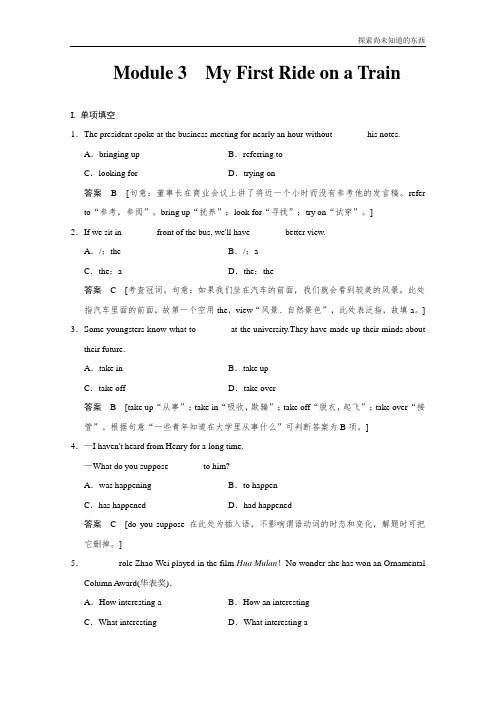
Module 3My First Ride on a TrainI. 单项填空1.The president spoke at the business meeting for nearly an hour without________his notes.A.bringing up B.referring toC.looking for D.trying on答案B[句意:董事长在商业会议上讲了将近一个小时而没有参考他的发言稿。
refer to“参考,参阅”。
bring up“抚养”;look for“寻找”;try on“试穿”。
]2.If we sit in________front of the bus, we'll have________better view.A./;the B./;aC.the;a D.the;the答案C[考查冠词。
句意:如果我们坐在汽车的前面,我们就会看到较美的风景。
此处指汽车里面的前面,故第一个空用the,view“风景、自然景色”,此处表泛指,故填a。
] 3.Some youngsters know what to________at the university.They have made up their minds about their future.A.take in B.take upC.take off D.take over答案B[take up“从事”;take in“吸收,欺骗”;take off“脱衣,起飞”;take over“接管”。
根据句意“一些青年知道在大学里从事什么”可判断答案为B项。
]4.—I haven't heard from Henry for a long time.—What do you suppose________to him?A.was happening B.to happenC.has happened D.had happened答案C[do you suppose 在此处为插入语,不影响谓语动词的时态和变化,解题时可把它删掉。
外研社版英语必修一Module3词汇精讲.docx

Module 3 My First Ride on a Train★核心词汇部分精选高考高频词汇核心突破,重点记忆。
核心词汇词义备注(其他词性的变化)abandoned adj •被遗弃的abandon vt・放弃;丢弃;停止进行,终止abandonment n.放弃;抛弃;遗弃;放任apartment n.(美)公寓;单元住宅part vt•使分裂;拆移;使分开apart (from)adj•分离的,隔离的cartoon n.卡通;漫画vt•为 ... 画漫画cartoonist n•漫画家ceremony n・仪式;礼仪,礼节ceremonial adj•仪式的;正式的ceremonious adj•好礼仪的,讲究礼节的desertlMezat] n.沙漠;荒地adj•沙漠的;荒芜的,不毛的v・离弃,舍弃(某地)[区分Jdessert |di'za:t]n.餐后甜食;甜点event n.事件(尤指重大事件)eventual adj.(事件)最终发生的;终于的eventually adv.终于,最后;竟;总归eventful adj.充满大事的,多变故的exhausted adj •疲惫不堪的exhaust vt・用尽,耗尽;使精疲力尽exhaustion n・疲惫,衰竭;枯竭,用尽exhausting adj•使耗尽的,使人精疲力竭的exhaustible adj•可空竭的,可耗尽的[反义]inexhaustible adj.无穷无尽的expert n・专家;权威adj•专家的;vt•以专家身份研究(或检查)expertly adv.熟练地frighten vt•是吃惊;惊吓fright n・恐怖;惊吓;可怕的东西frightened adj•害怕的;受惊的frightening adj.令人恐惧的;引起突然惊恐的frightful adj•可怕的;令人毛骨悚然的interview n・面试;面谈vt.& vi•面试interviewer n.(面试时的)主考官;面谈者interviewee n•被接见者;被访问者journey n.旅程[辨析Ijourney指经由陆路、空路或海路,从一地到另一地的旅程,如:a journey of over 2, 000 miles (2, 000多英里的旅程)。
外研版高中英语必修1 Module 3《My First Ride on a Train》Secti
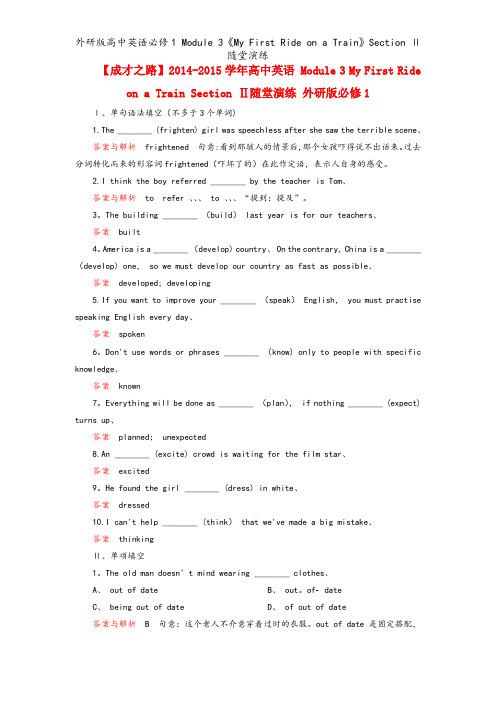
【成才之路】2014-2015学年高中英语 Module 3 My First Ride on a Train Section Ⅱ随堂演练外研版必修1 Ⅰ、单句语法填空(不多于3个单词)1.The ________ (frighten) girl was speechless after she saw the terrible scene、答案与解析frightened 句意:看到那骇人的情景后,那个女孩吓得说不出话来。
过去分词转化而来的形容词frightened(吓坏了的)在此作定语,表示人自身的感受。
2.I think the boy referred ________ by the teacher is Tom、答案与解析to refer 、、、 to 、、、“提到;提及”。
3。
The building ________ (build) last year is for our teachers、答案built4。
America is a ________ (develop) country、 On the contrary, China is a ________ (develop) one, so we must develop our country as fast as possible、答案developed; developing5.If you want to improve your ________ (speak) English, you must practise speaking English every day、答案spoken6。
Don't use words or phrases ________ (know) only to people with specific knowledge、答案known7。
Everything will be done as ________ (plan), if nothing ________ (expect) turns up、答案planned; unexpected8.An ________ (excite) crowd is waiting for the film star、答案excited9。
高中英语外研版必修一《module 3 my first ride on a train》课件
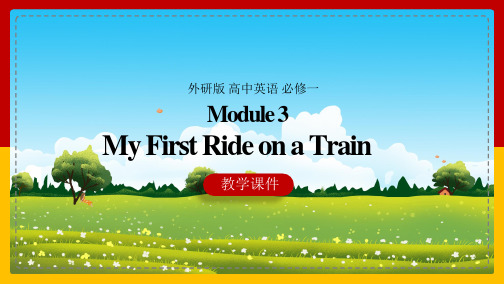
点拨 (1)in the distance在远方 at/from a distance从远处;隔开一段距离 within walking distance 步行可到达的地方 keep sb. at a distance与某人疏远 keep one’s distance from...与……保持距离
据报道将有一个对新任州长的采访。 ④We interviewed ten people for the job. 我们为这份工作面试了十人。 ⑤Next week, I will be interviewing Spielberg about his latest movie. 下周我将拜访斯皮尔伯格,谈论他的最新电影。
(2)distant adj.遥远的;远处的 a distant village一个遥远的村庄 a distant relative一个远房亲戚 【点津】对于distance的提问多用what,而不用how far。
2. abandoned adj.被抛弃的;放纵的 教材原句 ①We saw abandoned (abandon) farms which were built more than a hundred years ago. ◆用abandon的适当情势填空 ②However, these plans were abandoned because of financial problems.
外研版 高中英语 必修一
Module 3
My First Ride on a Train
教学课件
重点单词
1. distance n.距离;远方;遥远;疏远 v.与……疏远 教材原句 ①I first travelled a long distance (长途旅行) by train when I was six years old.
外研版高中英语必修1Module 3My First Ride on a Train
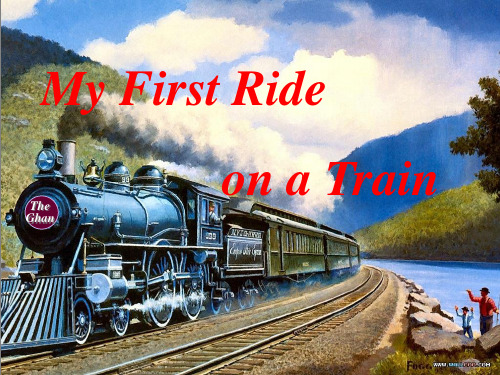
Fast reading Match the main idea wi.
Para 4. Para 5. Para 6.
What did I see on the train? What did I do on the train? I had my first ride on a longdistance train. What were the camels used to do?
They g_o_t_o_n___in Sydney where andg_o_t__of_f_ in Alice Springs, which
is_in__th_e_m__id_d_l_e of Australia
Recently, she had her _fi_rs_t ride on a how _lo_n_g_-_d_is_ta_n_c_e train,the famous Ghan
What happened to the camels in the 1920s? Why is the train called the Ghan?
Careful reading
Read para.1 and fill in the table
who
Alice, an __18_-_ye_a_r_-o_ld____ girl, comes from_S_y_dn_e_y__ ,together with a friend
My First Ride
on a Train
The Ghan
Sydney Opera House
Do you know what it is?
kangaroo
Koala bear
platypus
Kangaroos
外研版必修一英语:Module3 My First Ride on a Train. 课件

Listening & Speaking &Writing
1. Know how to get information happened in the past. 2. Describe childhood memories.
Listening Task:
Mary Lennon: No! I hated it! Interviewer: Why? Were you sick? Mary Lennon: __N_o_t_a_t_a_l_l_! I was bored! Interviewer: Who invited you to go to America? And
2
3
4
5
My first cycling
Childhood
Very little
Four years
old
A
kinderga swimming cinema
r-ten
pool
persons
My father A boy
I and I
and I
My cousin Others and I and I
1
Everyday English Complete each sentence with one of the expressions
Interviewer:Tell me…Is that night?Oh,I see goodness! Mary Lennon:Oh yes!Not at all.Absolutely Definitely. InterviewTeerl:l _m_e______, did you enjoy making films? Mary LennOohn:y_e_s______! It was good fun! Sometimes we made three films in a week. InterviewGero:o_d_n_e_s_s_____! Weren’t you bored? Mary LennonN:o_t_a_t_a_l_l_____! It was good fun.
外研版高中英语必修一Module3MyFirstRideonaTrain典句精讲
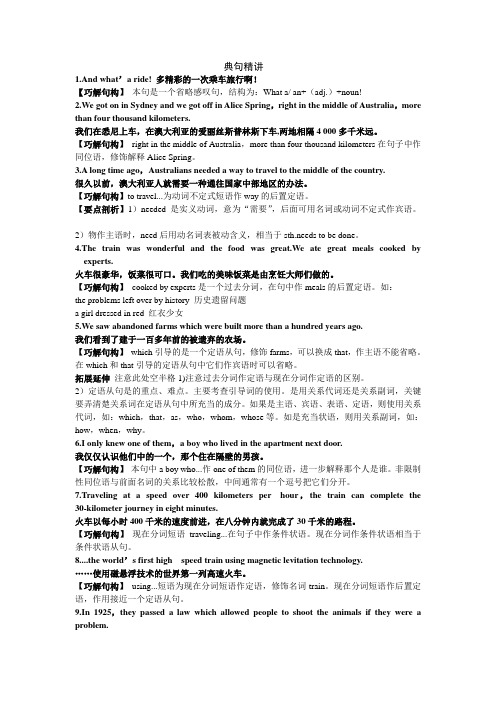
典句精讲1.And what’a ride! 多精彩的一次乘车旅行啊!【巧解句构】本句是一个省略感叹句,结构为:What a/ an+(adj.)+noun!2.We got on in Sydney and we got off in Alice Spring,right in the middle of Australia,more than four thousand kilometers.我们在悉尼上车,在澳大利亚的爱丽丝斯普林斯下车,两地相隔4 000多千米远。
【巧解句构】right in the middle of Australia,more than four thousand kilometers在句子中作同位语,修饰解释Alice Spring。
3.A long time ago,Australians needed a way to travel to the middle of the country.很久以前,澳大利亚人就需要一种通往国家中部地区的办法。
【巧解句构】to travel...为动词不定式短语作way的后置定语。
【要点剖析】1)needed是实义动词,意为“需要”,后面可用名词或动词不定式作宾语。
2)物作主语时,need后用动名词表被动含义,相当于sth.needs to be done。
4.The train was wonderful and the food was great.We ate great meals cooked by experts.火车很豪华,饭菜很可口。
我们吃的美味饭菜是由烹饪大师们做的。
【巧解句构】cooked by experts是一个过去分词,在句中作meals的后置定语。
如:the problems left over by history 历史遗留问题a girl dressed in red 红衣少女5.We saw abandoned farms which were built more than a hundred years ago.我们看到了建于一百多年前的被遗弃的农场。
- 1、下载文档前请自行甄别文档内容的完整性,平台不提供额外的编辑、内容补充、找答案等附加服务。
- 2、"仅部分预览"的文档,不可在线预览部分如存在完整性等问题,可反馈申请退款(可完整预览的文档不适用该条件!)。
- 3、如文档侵犯您的权益,请联系客服反馈,我们会尽快为您处理(人工客服工作时间:9:00-18:30)。
Module 3 My First Ride on a TrainThe Second PeriodThe General Idea of This PeriodIn this period, we're going to read a passage about My First Ride on a Train. We'll finish the five activities on Page 22-24. Let the students answer the questions about Australia match some words with these definitions. Get the general idea of this passage. Answer and discuss some questions. Teaching Aims1. Learn and master the following wordsabandoned camel cassette desert diamond expert midnight product scenery shoot soil journey train2. Train the student's reading ability.3. Tell the students something about Australia.4. To know something about traveling to the central part of Australia.Teaching Important Points1. How to grasp the general idea of the passage.2. Know something about Australia.Teaching Difficult PointHow to improve the student's reading ability.Teaching Methods1. Fast reading and careful reading to improve the students reading ability.2. Pair or group work to make every student work in class.3. Discussion to help the students grasp the detailed information.Teaching Aids1. A computer2. A projector3. The blackboardTeaching ProceduresStep 1 GreetingT: Good morning!S: Good morning, teacher!T: Sit down, please!Step 2 Lead-inT: The weather in September is very nice. It's the best time to travel. Do you like travel?Ss: Yes.T: Have you ever been to Australia?Ss: No.T: Today let's learn something about Australia.Step 3 Presentation(Show picture of a Kangaroo on the screen.)T: What do you call it?Ss: A Kangaroo.T: Where does it live? Do you know?S: In Australia, of course.T: Open your books at Page 22, let's come to Australia.T: Do you know the name of the capital city?S: Canberra.T: Do you know how many people live there?S: About 20 million.T: What do you think the central part of the country is like?S: Desert.T: Where do you think most of the people live, in the central part of the country or on the coast? S: On the east/southeast coast.T: What Australian animals do you know about?S: Koala bear, Kangaroo, Duck billed platypus, echidna and dingo(澳洲野犬).T: Yes, very good, thanks a lot, some of these animals are marsupials, that is, the mother keeps the baby in a pouch on her stomach.T: Now, you've known much about Australia.Step 4 Learning to Read(Show a passage on the screen.)T: Well, let's look at the screen. Read through the passage, you'll learn something more aboutAustralia.Culture Box: AustraliaAustralia is 7 686 850 square km, with 25 760 km of coastline. It is the 6th largest country in the world, but has a relatively small population, because much of the central and western part of the country is uninhabitable, being desert. There are 19 731 984 people (July 2003 estimate) living there. Of these,6.2 million live in New South Wales, and 3 789 000 live in Sydney,3.3 million in Melbourne,1.5 million in Brisbane, and only 313 000 in the Capital,Canberra.85% of the population occupy 1% of the land! There are 386 049 aborigines living there, they are the indigenous people of Australia.The climate is variable. The center and west is arid desert and semi desert, the south and east is temperate and the north is tropical. The lowest point is Lake Eyre (15 m below sea level) and the highest point is Mount Kosciusko (2229 m above sea level).6.86% of the land in arable.The country is divided into 6 states (New South Wales, Queensland, South Australia, Tasmania, Victoria, Western Australia) and 2 territories (Australian Capital Territory, Northern Territory).Step 5 Word StudyT: Before we read the passage, my first ride on the train, check the meaning of these words. (Show them on the screen.)abandoned adj.被遗弃的,camels,cassette,clouds,colorful,desert,diamonds, distance,experts,famous,farms,fields, food,products,recently,sand,scenery,shine,shoot,soil,supply,weather1. Read through the words as the students follow, and make sure the students understand the words.2. Pay attention to the correct pronunciation of them.3. Tick the words you will see in the passage.4. (Brainstorm) get the students to match some of the words with these definitions quickly.(1)First ask them to do the activity individually then check the answers.(2)Call back the answers from the class.Suggested answers:①desert②diamonds③passengers④sand⑤clouds⑥soil(field)/farms(3)Go through the "learning to learn box" with the students.Step 6Fast-readingT: Open your books at Page 23 and listen to the tape carefully.1. Play the tape for the students to listen for the first time, and tell the students to catch the main idea of the passage "My First Ride on a Train".2. Read through the topics as the students follow.3. Ask students to do the activity individually, and then check with the other students. Suggested answers:The passage is about traveling to the central part of Australia.Step 7 Careful-readingGet the students to read by themselves carefully then give some questions to answer.(Show the question on the screen.)Q1: Did Alice travel on the train a long time ago?Q2: Was her destination on the coast of Australia?Q3: Was the scenery the same during the whole journey?Q4: Did she study while she was on the train?Q5: Did the Australians use horses to travel to the central part of the country?Q6: Do they still use camels to deliver goods?1. Read through the questions and make sure that the students understand them.2. Ask students to do the activity individually, and then check the answers with the students. Suggested answers:1. No, she traveled on the train recently.2. No, Alice travelled in the centre of Australia.3. No, at first there were fields, and then it was desert.4. Yes, she studied Chinese.5. Yes, at first, but the horses didn't like the hot weather.6. No, they use the train now.Step 8 Discussion1. Put the students into groups of four to discuss the question.Q1: What sort of people do you think travel on the Ghan train?Fill in the form (If the train can hold 40 people).What sort of people Number of people Why do you think they will be on the Ghan train?Young students 5 They are having a holiday.They like traveling on the train.Chinese 10 They want to see Australia.They are in a group.Q2: What kind of towns and villages do you think the train passed?(Show some pictures of the cities, rural villages in Australia.)First find out cities, such as Sydney, Alice Springs, then let Ss describe the route of the train movements. (to the west, turn north, to the east)2. Call back answers from the class. Students' own answers are various.Additional topicTeacher give the tips for traveling abroad, whether you are traveling overseas for business, pleasure or study, the best way to ensure a carefree and relaxing trip is to prevent problems before they happen. The more you learn about passports, visas, customs, and other travel basics, the less likely you are to have difficulties during your travels.Let the students think after class:1. What will you prepare before you go?2. While you are on the way, how to deal with the unexpected?3. Safety tips given while you are on the way?Step 9 Summary and HomeworkToday we have learned something more about "My First ride on the Train", we have known something about it, now homework for today.1. Read the passage again and again.2. Find out the phrases of the passage.Step 10 The Design of Writing on the BlackboardStep 11 Activity and Inquiry。
